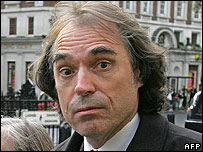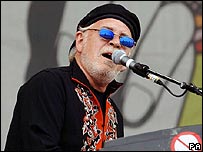
Fisher said his music was a large part of the song's appeal
Procol HarumBeyond
|
|
||
|
PH on stage | PH on record | PH in print | BtP features | What's new | Interact with BtP | For sale | Site search | Home |
|||
Matthew Fisher, a founding member of 1960s rock group Procol Harum, has won a High Court battle over who wrote their hit song A Whiter Shade of Pale.
|
|
Fisher said his music was a large part of the song's appeal |
Fisher played organ on the 1967 hit and argued he wrote the distinctive organ
melody. Mr Justice Blackburne ruled he was entitled to 40% of the copyright.
Fisher had wanted half but the court ruled lead singer Gary Brooker's
contribution was more substantial.
Fisher's claim for back royalties – of up to £1m – was also rejected.
For almost 40 years, the song has been credited to lead singer Gary Brooker and
lyricist Keith Reid.
Legal costs
Now a computer programmer living in Croydon, south-east London, Fisher said the
organ solo was inspired by classical composer Bach but he also had "his own
ideas in his head."
The 60-year-old said he made chord changes to the original Brooker sequence and
added to the work with a counterpoint to the song melody.
Mr Justice Blackburne, who studied both music and law at Cambridge – followed a
transcribed music score during the several occasions the song was played in the
High Court.
Brooker defended his claim to be the sole writer of the tune, which still
provides him with royalties – boosted by its recent popularity in the mobile
ringtone market.
The singer, who still fronts Procol Harum, faces paying a large part of the
legal costs estimated at around £500,000.
Later in the day, the above article was re-cast as follows:
Organist wins Procol Harum battle
Matthew Fisher, a founding member of 1960s rock group Procol Harum, has won a
High Court battle over who wrote their hit song A Whiter Shade of Pale.
He played organ on the 1967 hit and argued he wrote the distinctive organ
melody. Mr Justice Blackburne ruled he was entitled to 40% of the copyright.
Fisher, from London, had wanted half but the court decided lead singer Gary
Brooker's input was more substantial.
Fisher's claim for back royalties – of up to £1m – was also rejected.
For almost 40 years, the song has been credited to lead singer Gary Brooker and
lyricist Keith Reid.
 |
If Matthew Fisher's name ends up on my song, then
mine can come off Gary Brooker, Procol Harum singer
|
"I find that the organ solo is a distinctive and significant contribution to
the overall composition and, quite obviously, the product of skill and labour on
the part of the person who created it," the judge said.
Now a computer programmer, Fisher said the organ solo was inspired by composer
Bach but he also had "his own ideas in his head."
The 60-year-old said he made chord changes to the original Brooker sequence and
added to the work with a counterpoint to the song melody.
Mr Justice Blackburne, who studied both music and law at Cambridge – followed a
transcribed music score during the several occasions the song was played in
court.
Brooker defended his claim to be the sole writer of the tune, which still
provides him with royalties – boosted by its recent popularity in the mobile
ringtone market.
The singer, who still fronts Procol Harum, faces paying a large part of the
legal costs estimated at around £500,000.
'Unspoken resentment'
In a statement, Brooker said his former bandmate had no right to be credited as
a writer of the song: "If Matthew Fisher's name ends up on my song, then mine
can come off!"
He added: "It's hard to believe that I've worked with somebody on and off since
1967 whilst they hid such unspoken resentment.
"I'm relieved the trial is over, but my faith in British justice is shattered."
Outside the court, Fisher insisted his case was not about the money, and he said
he doubted whether he would ever play the song in public again.
He added: "I think I can assume that from now on I'm not going to be on Gary and
Keith's Christmas card lists but I think that's a small price to pay for finally
securing my rightful place in rock and roll history.
"I'd just like to say that it's a great pity that this matter could not have
been resolved amicably."
The judge granted Brooker permission to appeal.
More about the AWSoP lawsuit
|
|
PH on stage | PH on record | PH in print | BtP features | What's new | Interact with BtP | For sale | Site search | Home |